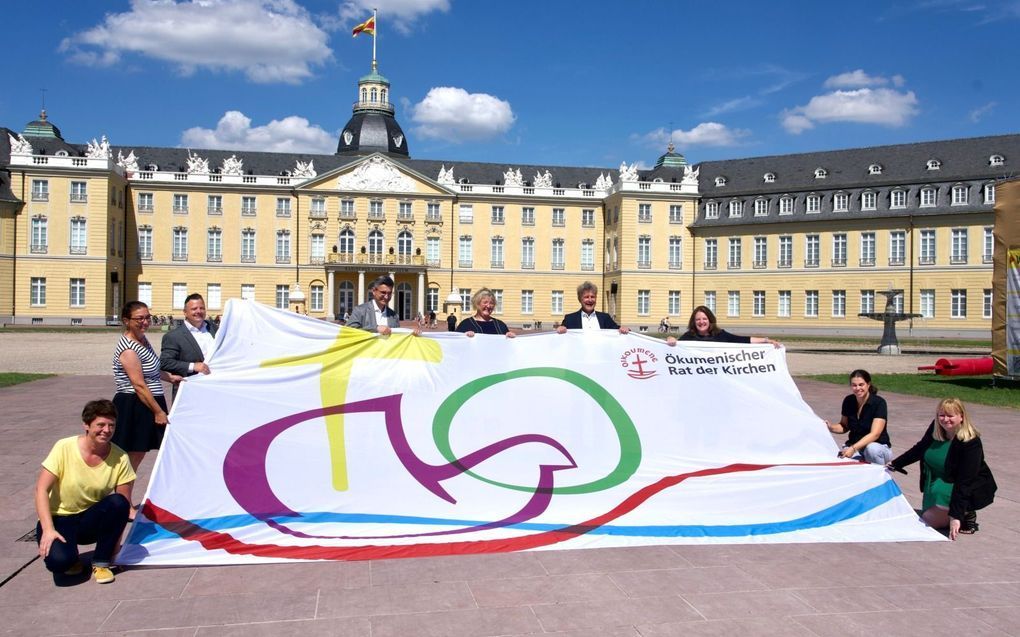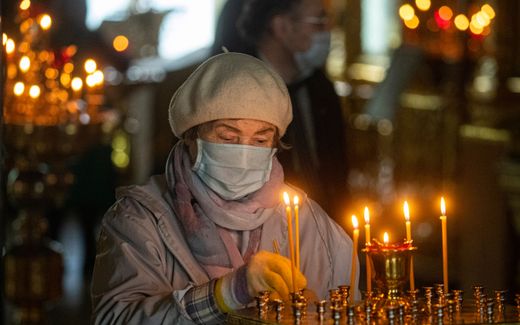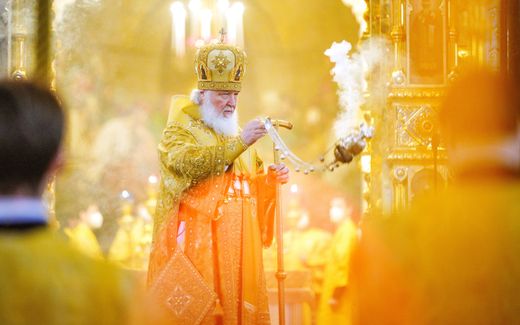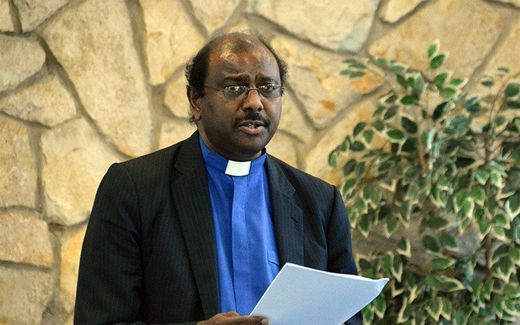Eleventh meeting World Council of Churches starts in Karlsruhe
31-08-2022
European Union
Klaas van der Zwaag, RD

Bishop Heike Springhart of the Landeskirche in Baden (second left) and the mayor of Karlsruhe, Frank Mentrup (third left) hold a flag of the 11th assembly of the World Council of Churches together with other urban institutes of Karlsruhe and the World Council. Photo WCC, Marelo Schneider
European Union
When Heike Springhart, Bishop of the Landeskirche in Baden (Germany), looked out over the streets of Karlsruhe on Saturday, on the eve of the 11th Assembly of the World Council of Churches (WCC), she shared a sense of excitement. "The world is coming to Karlsruhe! A reason to be excited and moved."
No doubt an exaggeration. But the fact is that, from 31 August to 9 September, 4,000 representatives from 352 churches from 120 countries will gather in the German city.
Karlsruhe already had a flag incorporating the Assembly's logo, which is intended to symbolise the worldwide church. During the Assembly, around 250 publicly accessible events will be offered at eight locations in the city.
The mayor of Karlsruhe, Frank Mentrup, expressed how much he was looking forward to this important meeting. "We welcome people from all over the world, who will communicate with us and each other on the topics relevant to the present and our future," he said.
The Global Ecumenical Theological Institute (GETI) opening on Saturday brought together 100 young theologians, including students from the Bossey Ecumenical Institute near Geneva. Currently, "pre-assemblies" of young people and organisations advocating the rights of indigenous peoples are running. German Federal President Frank-Walter Steinmeier delivers the keynote address at the official opening of the Assembly on Wednesday, and the Prime Minister of Baden-Württemberg, Winifred Kretschmann, also greets the Assembly.
War again
During the preparations for the establishment of the World Council of Churches in continental Europe -1948- the organisers were confronted with the question of how to restore fellowship between citizens of countries that had recently fought each other so bloody. Protestant leaders meeting in October 1945 adopted the Stuttgart Declaration of Guilt, in which they confessed that "shared suffering among the people of a nation implies shared guilt." In the words of the declaration, "We blame ourselves for not witnessing more courageously, not praying more faithfully, not believing more joyfully and not loving more fervently."
Among the ecumenical leaders who advocated this basis for reconciliation were W. A. Visser 't Hooft, Karl Barth, Martin Niemöller and other former activists from the Confessing Church in Germany, the church in which Dietrich Bonhoeffer also played a prominent role.
The eleventh Assembly
The World Council of Churches will hold its eleventh Assembly over the next ten days in Karlsruhe, Germany. A few terms explained.
Assembly
The Assembly is the highest governing body of the World Council, which is held every six to eight years. During the Assembly, the integral policies of the member churches are discussed, public statements are made, and decisions are made on the strategy for the next eight years. This time, the Assembly is taking place at the invitation of the Protestant Church in Germany (EKD), the Protestant Church in Baden, the Council of Churches in Germany, the Union of Protestant Churches in Alsace and Lorraine, together with the Protestant Church in Switzerland.
History
The World Council of Churches was founded in Amsterdam in 1948. It subsequently met in Evanston (USA) (1965), New Delhi (India) (1961), Uppsala (Sweden) (1968), Nairobi (Kenya) (1975), Vancouver (Canada) (1983), Canberra (Australia) (1991), Harare (Zimbabwe) (1998), Porto Allegre (Brazil) (2006) and Busan (South Korea) (2013).
Central Committee
The Central Committee is the highest decision-making body of the World Council, elected by the last Assembly. The Central Committee meets every twelve to eighteen months. It is responsible for carrying out the policies established at the previous Assembly. The Governing Body consists of about 150 members and is elected at each Assembly.
Members
The World Council has some 350 member churches, representing 580 million members from more than 110 countries, including Orthodox, Methodist, Anglican, Protestant and United Churches. At its foundation, churches in Europe and North America were mainly involved; now, most churches are found in Africa, Asia, Latin America, the Caribbean and the Middle East. The Roman Catholic Church (RCC), which is not a member of the World Council, attends the Assembly as an observer and participates in various bodies of the World Council. The RCC has the right to speak but not to vote. Roman Catholic advisers are also involved in the Commission for World Mission and Evangelisation.
Geneva
The main office of the World Council of Churches is located in Geneva.
Attempts to attract the participation of the (Eastern) Orthodox churches in the developing Eastern bloc countries were unsuccessful. It would take more than a decade of church diplomacy before Eastern Orthodox churches would join the World Council of Churches at the Third Assembly in New Delhi in 1961.
The war in Europe was on the minds of the Amsterdam representatives at the World Council's founding meeting in 1948: a recent, terrible war and the looming potential for violence between East and West.
The eleventh Assembly of the World Council of Churches, the third to be held in Europe, is meeting in the shadow of a devastating war between Russia and Ukraine, Theodore Gill writes on the WCC website. Gill is a Presbyterian Church (USA) pastor and served the WCC from 2002 to 2016. "Once again, people and churches are facing each other. As in Amsterdam, attendees are asking: What can we say? What can we do? Can we hope to make a real difference? In the face of such disorder, how should we proclaim God's plan?"
Appendix
The proportion of Eastern Orthodox among the 800 or so official delegates to the Assembly in Karlsruhe is as high as 20 per cent. The Russian Orthodox Metropolitan Hilarion, who was dismissed by Putin in June and replaced by a state representative, explains in one of the preparatory documents on behalf of the Eastern Orthodox community that "the state of morality in today's society calls for the defence of the traditional values of family and marriage, the defence of human life from the moment of conception until natural death." "We must not turn a blind eye to the fact that certain parts of the Western Christian world are sliding towards the abyss of an absolute rejection of the Gospel and Christ and are thus following the path of moral relativism and degeneracy."
He noted that a document on sexuality discussed at the last meeting of the World Council's central committee in June was "relatively balanced", but that an appendix, which had not been presented at that meeting but was added anyway, was vetoed by the Russian Orthodox Church "because it justified the LGBT ideology". "We must assure ourselves that this appendix will not be adopted during the upcoming deliberations." In short, a thorny issue is at least on the agenda.
Related Articles





